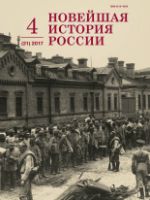Деятельность Комиссии для обследования положения продовольственного дела в Петрограде в 1917 году
Activities of the Commission for the Examination of the Food Situation in Petrograd in 1917
Author(s): O.N. KuznetsovaSubject(s): Government/Political systems, Pre-WW I & WW I (1900 -1919)
Published by: Издательство Исторического факультета СПбГУ
Keywords: Petrograd; 1917; food issues; Special Council on Food Supply in Petrograd; Commission for the examination of the food situation; M.Berenshtam;
Summary/Abstract: The article is devoted to examination of food situation in Petrograd, particularly of activity of the Special Council on Food Supply and Commission for the examination of the food situation in Petrograd in 1917. The aim of the Commission was the inspection and improvement of the food situation in the capital city. One of the major causes why The Russian Provisional Government established the Commission was the criticism of activities of The Special Council on Food Supply and its head W. Groman. In particular, the workers of Council were accused of mass spoilage of food, embezzlement and other abuses. The resolutions of the Commission concerned providing necessary documentation for the Council’s activity, the food supplies in the capital city and the problems of food distribution in Petrograd. Those resolutions were handed over to Ministry of Food. The Commission was led by M.Berenshtam, one of the assistants of the Minister of Food of The Provisional Government. The article analyses the composition of the Commission, activities of its sections and the means that were suggested in order to solve the food issues in 1917. Special attention should be paid to reaction of citizens of Petrograd — particularly of house committees of the city — to solving of food distribution problems and to rationing. The Commission for the examination of the food situation in Petrograd started its work on the 3rd of August and finished it on the 23rd of September 1917. As a result of the inspection the Commission came to the conclusion that most of the rumors about ineffective activities of the Council and its chairman were unfounded. The conclusions of the Commission were similar to the comments of the Council’s members, when the hard food situation was explained by reasons of a general character. In particular, by the crisis and disarrangement of transport. At the same time neither the Council nor the Commission could resolve the food problems in Petrograd in 1917
Journal: Новейшая история России
- Issue Year: 7/2017
- Issue No: 21
- Page Range: 22-31
- Page Count: 10
- Language: Russian

